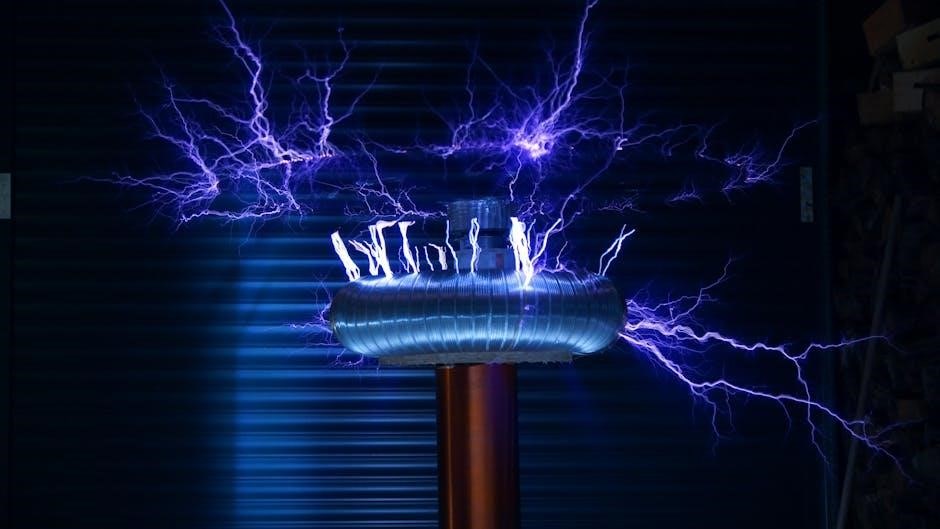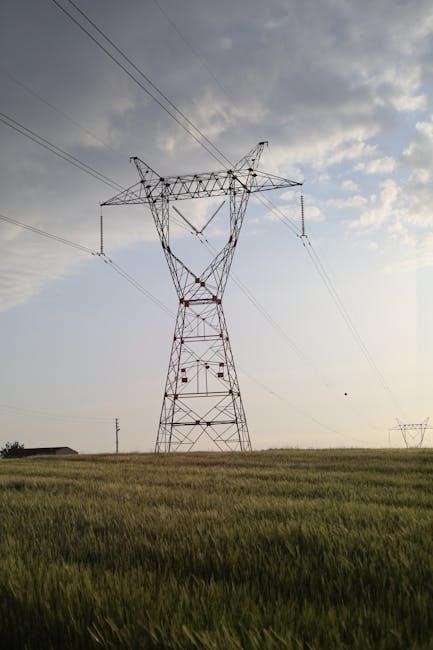electrical award pay guide 2023
Category : Australia
The Electrical Award Pay Guide 2023 outlines pay rates, working hours, and entitlements for electrical workers, ensuring compliance with the Fair Work Commission’s standards.
Overview of the Electrical Award
The Electrical Award governs pay rates, allowances, and working conditions for employees in the electrical contracting industry. It applies to electricians, apprentices, and related roles, ensuring fair wages and safe working conditions. Established by the Fair Work Commission, the award is regularly updated to reflect industry standards and economic changes, providing clarity on entitlements and compliance requirements for employers and employees alike.
Who the Electrical Award Covers
This award applies to all electrical workers, including electricians, linespersons, and apprentices, engaged in electrical contracting. It covers employers and employees in the electrical industry, ensuring standardized pay rates and conditions. The award also extends to related roles, such as electrical assistants and technicians, providing a comprehensive framework for fair compensation and workplace rights across the electrical sector.

Pay Rates Under the Electrical Award
The Electrical Award sets minimum wages, with a 5.75% increase in 2023. Rates include industry, tool, and electrician’s licence allowances, ensuring fair pay standards.
Minimum Wage Rates for Apprentices
Minimum wage rates for apprentices under the Electrical Award vary based on experience and education. Junior apprentices who haven’t completed Year 12 earn $555.63 weekly, while those who have completed Year 12 earn $609.01. Adult apprentices over 21 receive higher rates, reflecting their expertise. These rates are adjusted annually, with a 5.75% increase in 2023, ensuring fair pay progression and supporting apprentices in their career development within the electrical industry.
Adult Electricians’ Pay Rates
Adult electricians’ pay rates under the Electrical Award are structured based on experience and qualifications. Level 4 electricians earn $1,018.90 weekly, with an hourly rate of $26.81, while Level 5 electrical assistants receive $945.90 weekly, at $24.89 per hour. These rates include industry, tool, and electrician’s licence allowances, ensuring comprehensive compensation for skilled workers in the electrical contracting industry, reflecting their expertise and contributions.

Allowances and Loadings
Allowances and loadings under the Electrical Award include industry, tool, and licence allowances, integrated into the all-purpose hourly rate, adjusted by 5.75% as per the Fair Work Commission’s decision.
Industry Allowance and Tool Allowance
The Electrical Award includes an industry allowance and tool allowance, integrated into the all-purpose hourly rate. These allowances cover workplace-related expenses and tools required for electrical work. The industry allowance compensates for site conditions, while the tool allowance offsets the cost of personal equipment. Both are adjusted annually, with a 5.75% increase applied in 2023, ensuring fair compensation for electricians and apprentices under the award.
Electrician’s Licence Allowance
The Electrician’s Licence Allowance is a weekly payment compensating for the cost of maintaining a valid electrical licence. This allowance is included in the all-purpose hourly rate and applies to all licensed electricians under the award. In 2023, the allowance increased by 5.75%, aligning with the Fair Work Commission’s wage adjustment. It ensures electricians are fairly compensated for the mandatory credentials required to perform their duties safely and legally.
Working Hours and Leave Arrangements
Ordinary hours for electrical workers are 38 per week, with overtime rates applying beyond this. Public holidays attract penalty rates, and leave entitlements include annual, sick, and rostered days off.
Ordinary Hours and Public Holiday Rates
Ordinary hours for electrical workers are set at 38 hours per week, with a base ordinary hourly rate. Public holidays attract a rate of 250% of the ordinary hourly rate. Overtime rates apply beyond the standard hours. These provisions ensure fair compensation and work-life balance for employees covered under the Electrical Award Pay Guide 2023.
Leave Entitlements for Electrical Workers
The Electrical Award Pay Guide 2023 provides specific leave entitlements for electrical workers, including annual leave, personal/carer’s leave, and public holidays. Employees are entitled to 20 days of annual leave per year, paid at their base rate. Personal leave allows for 10 days per year for sickness or family care. Public holidays are paid at 250% of the ordinary hourly rate, ensuring fair compensation for time off.

Apprenticeships in the Electrical Industry
Apprenticeships in the electrical industry offer structured training and wage progression, with rates varying based on experience and qualifications, ensuring skill development and career advancement opportunities.
Junior Apprentice Wage Rates
Junior apprentices in the electrical industry receive structured wage rates based on their progress. Those who have not completed Year 12 earn $555.63 per week, while those who have completed Year 12 receive $609.01 weekly. These rates reflect their developmental stage and align with industry standards, ensuring fair compensation as they gain experience and skills under the Electrical Award Pay Guide 2023.
Training Requirements and Career Progression
Junior apprentices must complete structured training programs, often requiring the completion of Year 12 or equivalent. Career progression is tied to experience and skill development, with wage increases corresponding to advancing levels. Apprentices transition to senior roles upon completing their training, ultimately qualifying as licensed electricians. This pathway ensures a skilled workforce and adherence to industry standards under the Electrical Award Pay Guide 2023.

Compliance and Enforcement
Employers must adhere to the Electrical Award’s terms, with the Fair Work Commission ensuring compliance. Non-compliance can lead to penalties, protecting workers’ rights and promoting fair practices.
Understanding Your Rights and Obligations
Under the Electrical Award, employees and employers must understand their rights and obligations. Employees are entitled to fair pay, safe working conditions, and leave entitlements. Employers must ensure compliance with minimum wage rates, allowances, and working hours. The Fair Work Commission provides resources to help both parties navigate these requirements, ensuring a fair and lawful workplace environment for all electrical workers.
Reporting Non-Compliance and Disputes
Employees or employers can report non-compliance with the Electrical Award to the Fair Work Commission. Disputes regarding pay rates, allowances, or working conditions should be addressed through formal channels. Proper documentation and evidence are crucial for resolving issues. The Fair Work Commission provides guidance and support to ensure fair treatment and compliance with the award’s terms, promoting a transparent and lawful workplace environment.

Safety Considerations for Electricians
Safety is critical for electricians, involving proper PPE, hazard identification, and adherence to safety protocols to prevent electrical shocks, arcs, and falls, ensuring workplace protection.
Essential PPE for Electrical Work
Electricians must wear essential PPE, including hard hats, safety glasses, insulated gloves, and non-conductive footwear, to prevent injuries from electrical shocks, arcs, and falls. Flame-resistant clothing and arc-rated gear are also crucial for high-risk tasks. Employers must ensure PPE is provided and maintained to comply with workplace safety standards, protecting workers from potential hazards in electrical environments.
Common Hazards and Prevention Measures
Common hazards in electrical work include shocks, arcs, and falls. Prevention measures involve proper PPE, regular equipment inspections, and adherence to safety protocols. Employers should conduct risk assessments and provide training to minimize risks, ensuring a safe working environment for electricians and contractors. Compliance with safety standards is essential to prevent injuries and fatalities in the industry.

Industry Trends and Outlook
The electrical industry is evolving rapidly, driven by technological advancements and increasing demand for renewable energy solutions. Electricians are in high demand as industries adopt sustainable practices and smart technologies. Growth in electric vehicle infrastructure and energy-efficient systems further supports a positive outlook for the sector.
Impact of Technological Advancements
Technological advancements are transforming the electrical industry, with smart systems and renewable energy solutions becoming integral. Automation and IoT devices enhance efficiency, reducing manual labor. Solar and battery technologies are increasingly adopted, creating specialized roles for electricians. These innovations not only boost demand for skilled workers but also influence pay structures, as employers invest in upskilling to meet modern demands. This trend ensures sustained growth and higher wages in the sector.

Future of Electrical Contracting
The future of electrical contracting is poised for growth, driven by renewable energy integration and smart technologies. As demand for sustainable solutions rises, electricians will play a key role in installing solar panels and energy-efficient systems. The rise of electric vehicles (EVs) also creates new opportunities, with the need for EV charging infrastructure. These advancements are expected to shape the industry, requiring contractors to adopt new skills and technologies to remain competitive and meet evolving client needs.

How to Find Pay Rates and Entitlements
Visit the Fair Work Ombudsman’s website or consult the Fair Work Commission for detailed pay rates and entitlements under the Electrical Award. Use online tools or guides specific to the MA000025 award to ensure accurate calculations and compliance with current regulations.
Using Online Resources and Tools
Utilize the Fair Work Ombudsman’s website to access the Electrical Award Pay Guide 2023. Online tools like pay calculators and entitlement checkers provide accurate wage rates, allowances, and loadings. Search for specific award codes, such as MA000025, to find detailed information. Regularly updated resources ensure compliance with the latest Fair Work Commission rulings and adjustments. These platforms simplify understanding complex pay structures and entitlements for electrical workers.
Consulting the Fair Work Commission
The Fair Work Commission (FWC) provides official guidance on the Electrical Award Pay Guide 2023. Their website offers detailed pay rates, entitlements, and any recent updates. Employers and employees can refer to the FWC for accurate interpretations of the award. The FWC also outlines procedures for resolving disputes and ensuring compliance with workplace laws. Regularly checking their resources helps stay informed about changes and ensures adherence to legal obligations.









